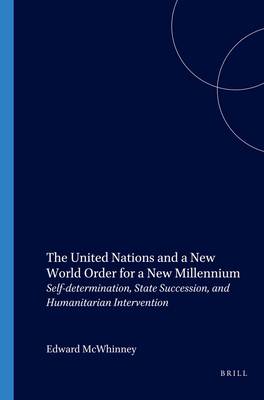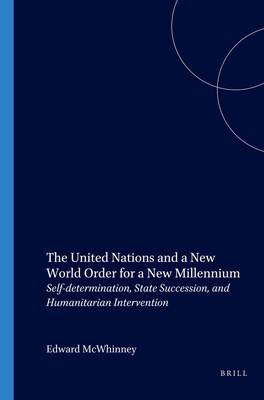
- Retrait gratuit dans votre magasin Club
- 7.000.000 titres dans notre catalogue
- Payer en toute sécurité
- Toujours un magasin près de chez vous
- Retrait gratuit dans votre magasin Club
- 7.000.0000 titres dans notre catalogue
- Payer en toute sécurité
- Toujours un magasin près de chez vous
The United Nations and a New World Order for a New Millennium
Self-Determination, State Succession, and Humanitarian Intervention
Edward McWhinney
151,45 €
+ 302 points
Description
The errors - military, political, and not least diplomatic - in the continuing unfolding of the Yugoslav tragedy over the decade since the Fall of the Berlin Wall and the final ending of the Cold War, offer certain lessons. It had been confidently predicted that the complex, multi-national Yugoslav state created by the World War I victors at Versailles in 1919, and continued by the post-World War II peace settlements, would not long survive Marshal Tito's death. As it happened, when the moment of truth arrived the concert of Western European powers had no clear and coherent plans ready for a rational brokering of the resulting problems of State Succession, including renewed federal or confederal structures, and peaceful and orderly transfer and relocation of civil populations if fragmentation and independence were to be the immediate policy options. The rush to a 'premature' State Recognition by one or more leading Western European political players, without having any congress of Berlin-style game-plan ready to guide and direct this, may have triggered the on-rush of political and military events that led, in quick succession, to the Bosnian and then the Kosovo tragedies of the 1990s.
The author, currently President of the Institut de Droit International and a jurisconsult and advisor, over the years, to international and national governmental authorities, examines consequences and challenges for International Law and Law-making, as we enter the new Millennium. Taking note of the antinomies and contradictions inherent in Classical International Law Categories like Territorial Integrity and the Self-determination of Peoples, the Non-Use-of-Force and Collective (regional) Self-Defence, the author considers, in particular, the direct conflict, in the case of both Bosnia and Kosovo, between the United Nations Charter principle of Non-Intervention and the claimed 'New' International Law principle of Humanitarian Intervention. The legally permissible modalities and structures and processes for exercise of Humanitarian Intervention, in accord with the United Nations Charter and also general International Law, are canvassed and weighed.
The author, currently President of the Institut de Droit International and a jurisconsult and advisor, over the years, to international and national governmental authorities, examines consequences and challenges for International Law and Law-making, as we enter the new Millennium. Taking note of the antinomies and contradictions inherent in Classical International Law Categories like Territorial Integrity and the Self-determination of Peoples, the Non-Use-of-Force and Collective (regional) Self-Defence, the author considers, in particular, the direct conflict, in the case of both Bosnia and Kosovo, between the United Nations Charter principle of Non-Intervention and the claimed 'New' International Law principle of Humanitarian Intervention. The legally permissible modalities and structures and processes for exercise of Humanitarian Intervention, in accord with the United Nations Charter and also general International Law, are canvassed and weighed.
Spécifications
Parties prenantes
- Auteur(s) :
- Editeur:
Contenu
- Nombre de pages :
- 120
- Langue:
- Anglais
- Collection :
- Tome:
- n° 44
Caractéristiques
- EAN:
- 9789041113719
- Date de parution :
- 01-04-00
- Format:
- Livre broché
- Format numérique:
- Trade paperback (VS)
- Dimensions :
- 165 mm x 244 mm
- Poids :
- 231 g

Les avis
Nous publions uniquement les avis qui respectent les conditions requises. Consultez nos conditions pour les avis.






